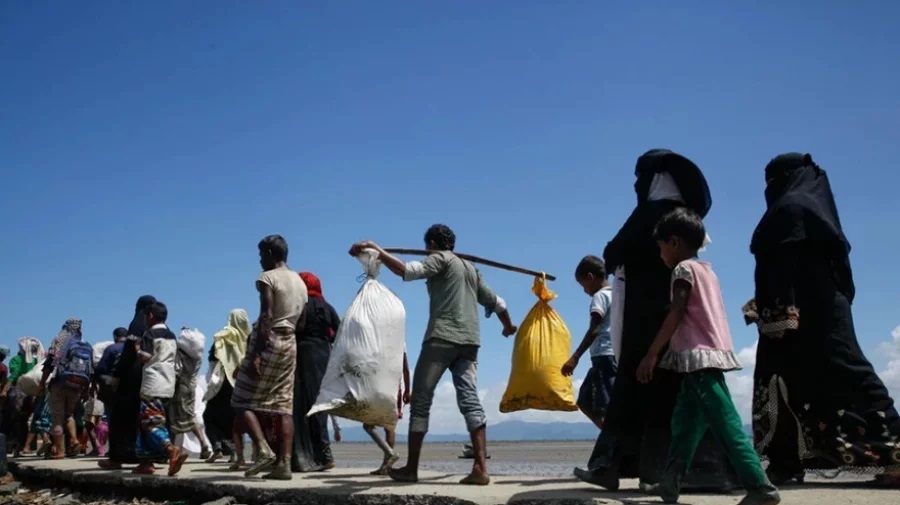The future of the Rohingya crisis: The answer is blowin’ in the wind of Ghumdhum
Bangladesh must think afresh about its Myanmar policy, no longer remaining hostage to reactive responses but advancing a multi-pronged foreign policy agenda-Lailufar Yasmin | Source : Dhaka Tribune, 09 February 2025

My whirlwind trip to Cox’s Bazar after quite some time was an eye-opener to some realities that were unknown to me staying away. Dhaka minds, I often thought, get as polluted as the air we breathe in when it comes to accepting ideas from outside of Dhaka.
What is happening there and what can be our options often get diluted when ground realities are not tasted. Places have their realities, which cannot be properly understood and evaluated until we step outside Dhaka.
Cox’s Bazar is one such place, gradually acquiring the characteristics of a metropolis, positively or negatively contributed by the Rohingya influx. As Bangladesh has been hosting about 1.2 million Rohingyas since August 2017, it has a direct stake in what is going on in the neighbouring state of Myanmar. As we want to see a durable resolution to the fate of the Rohingya, the fresh air of Cox’s Bazar provides some ideas into the current situation.
The number and nature of actors in the Rohingya crisis have changed since the onset of this crisis. As we are aware, Rohingya influx has happened before. Bangladesh has been able to negotiate and send some Rohingya before. What changed this time was a meticulous calculation on part of the Tatmadaw to create genocidal conditions for the Rohingya that left them with little choice but to flee for a safe haven.
One needs to understand the strategic timing of the Tatmadaw as well, which saw a divided and unresolved international community being unable to respond during the Crimea crisis, which provided them an opportunity to carry out their atrocities. One also must not forget that neither the so-called democratic government of Aung San Suu Kyi, nor the Myanmar civil societies raised a question during the entire operation of the Tatmadaw.
Almost seven and half years later, a new reality has unfolded before Bangladesh as it desperately searches for a sustainable solution to the crisis. The reality is multilayered and multi-faceted. At the immediate level, Myanmar is on the verge of being Balkanized. For us, at least two Myanmars exist: The Tatmadaw-controlled Myanmar and the Arakan Army-controlled Myanmar, on the west of Myanmar that matters to us.
The Arakan Army has emerged as a force to be reckoned with, due to its dynamic leadership and strategic foresight. The top leaders are educated with a clear understanding of the geopolitical significance of the Arakan region. It has relevance for Bangladesh as it now has to recognize (I do not mean a legal recognition) the political force that the Arakan Army brings under the leadership of Major General Twan Mrat Naing. It is also a positive development that the National Unity Government (NUG) first recognized the Rohingyas’ citizenship right in 2021, which provides much hope for Bangladesh.
Under the Westphalian system, the legality of a state as the principal political actor cannot be overlooked. Simultaneously, Bangladesh 2.0 needs to think afresh about its Myanmar policy. It can no longer remain hostage to being reactive to whatever is happening that can affect its future.
Bangladesh, for the first time, is at the throes of events that may lead to a regional change. It is time that we think of advancing a multi-pronged foreign policy agenda.
The stakeholders with which we were discussing initiating the return of the Rohingyas, no longer exist and no longer have any control in the bordering region. They are fighting to save their existence.
The Arakan Army, on the other hand, is willing to consider the return of the Rohingya favourably, although it was the NUG that first recognized the Rohingya as such. What the Rohingya require, at the least, is the assurance of their security and identity card, which will ensure the durability of their return. The Arakan Army needs to sell their agricultural products, while they require raw materials for building infrastructure.
I am not saying that we have to get engaged in the trade but we are talking about the comparative advantage that we may have in the future. Some semblance of Border Haats (border bazars) already exists where people from the neighbouring region have been doing business for quite some time. It is the Arakan region that can provide Bangladesh access to China in the east as the roads are almost completed to connect.
While people living in the Arakan region are hardly aware of the Westphalian diktat, and to them, the concept of border is alien, they understand that they need stability in the region to live a normal life and thrive. Understanding the strategic significance of the region, the Arakan Army has assured safeguarding of the special economic zones and infrastructure projects of its neighbouring countries.
Bangladesh should take into account these factors and start negotiations at the formal and informal channels with different stakeholders in our east, while keeping negotiations with the regional powers and other stakeholders, whose direct involvement will have further positive implications.
The world is at the cusp of rapid changes. Global realities and local realities would hardly converge. While there would be some implications of the events happening at the global level, local realities must have to take into account immediate threats and issues of the region.
As humans, we are always daunted by the “fear of the unknown.” But with no clear solution in sight, we cannot simply stay put and let things slither away from our hands.
Bangladesh can make tangible and intangible changes in the region, which will have direct impacts on the process of repatriation. Moments like these do not come easily. It is time we seize the moment.
Lailufar Yasmin is Professor and former Chair at the Department of International Relations, University of Dhaka, Bangladesh